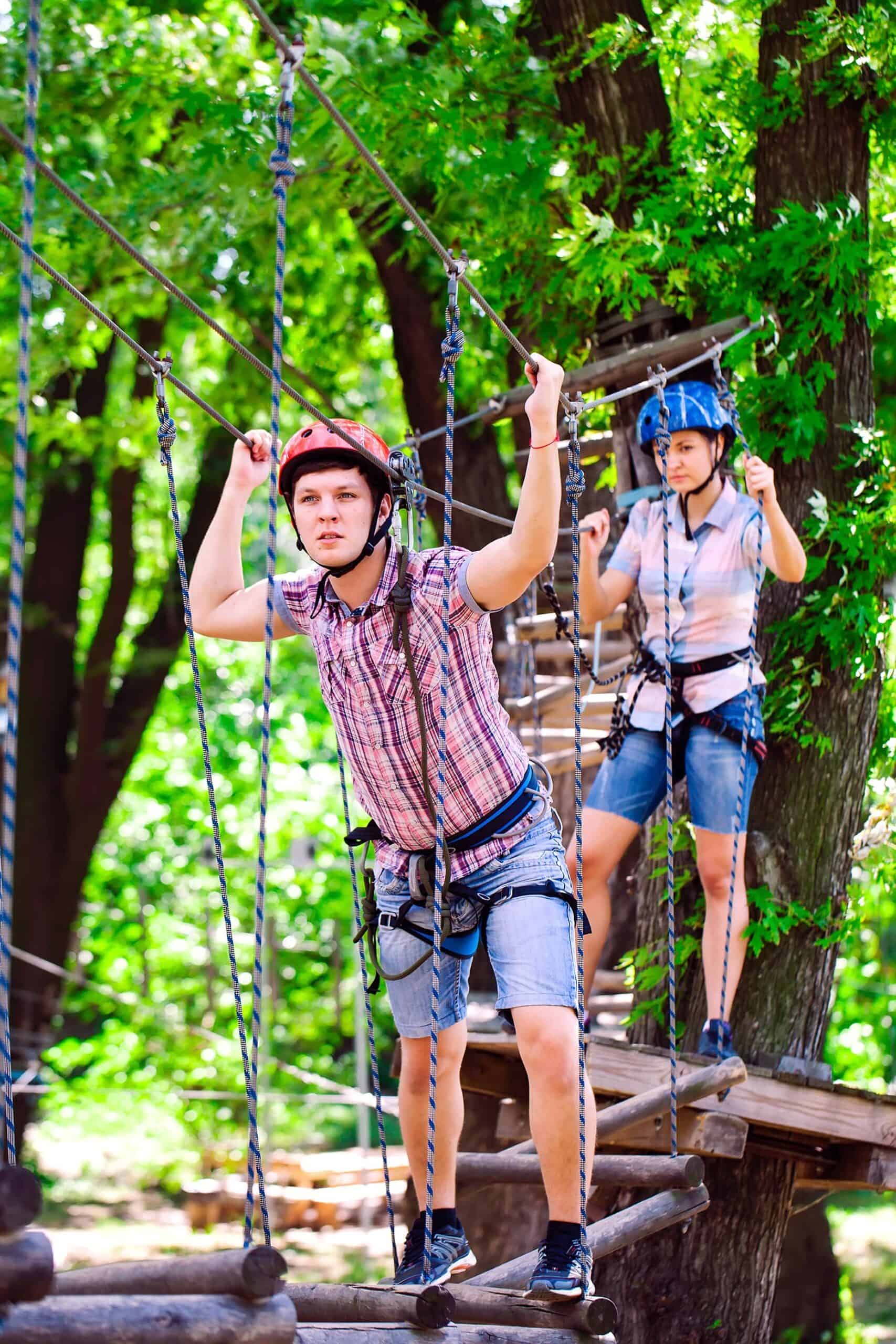Adventure Therapy for Addiction
Recovery in Atlanta, GA
We give you the support and the tools to start a new adventure in sobriety.

When someone is in recovery from addiction, they often have to deal with socialization and psychological issues to maintain their sobriety. Part of the recovery process is learning to engage with others in social settings that do not involve drinking or using drugs. As such, adventure therapy for addiction recovery is becoming an essential part of treatment programs. At Inner Voyage Recovery Center, our Atlanta rehab center provides an alternate approach to help you create a new life for yourself – adventure therapy.
What is Adventure Therapy for Addiction Recovery?
Adventure-based counseling (ABC) is a group therapy program utilizing experiential learning opportunities and engaging group activities. Combining nature, community, and daring exercises, adventure therapy is an effective tool for helping clients navigate a wide range of addiction and co-occurring mental health challenges.
Adventure therapy is a type of psychotherapy that uses outdoor activities and adventure-based challenges as part of the treatment process. Adventure therapy helps people to develop life skills such as problem-solving, communication, and teamwork. This form of therapy may also help individuals learn how to confront their fears and take risks to achieve personal growth.
At Inner Voyage Recovery Center, we utilize adventure therapy in our three levels of care that include:

Types of Adventure Therapy for Addiction Recovery
Some of the different types of adventure therapy for addiction recovery that could be available include the following:
Outdoor Activities:
Adventure therapy for addiction recovery often incorporates outdoor activities such as rock climbing, hiking, and rafting to help individuals confront their fears and take risks to achieve personal growth. These activities can also help build trust and communication skills while providing a safe environment for participants to practice new coping strategies.
Team Challenges:
Working together in teams is an integral part of adventure therapy. It encourages people to learn how to communicate effectively and develop problem-solving skills that they can apply elsewhere in life. This form of therapy may involve team challenges such as orienteering or building shelters, which require participants to work together towards common goals.
Wilderness Survival Courses:
Wilderness survival courses are another popular form of adventure therapy for addiction recovery, which teaches individuals how to become self-reliant and confident when faced with challenging situations. This activity helps participants push past their comfort zones and build resilience by learning basic wilderness skills like fire starting, shelter building, navigation techniques, or food preparation methods from experts in the field.
Adventure Camps:
Adventure camps provide a safe space where people can explore personal growth through various activities such as group discussions, interactive games, or creative projects focused on positive thinking and goal setting. This type of adventure therapy encourages individuals suffering from addiction issues to create meaningful connections with themselves and others by engaging with nature’s beauty at retreat locations around the world.
Nature Walks:
Nature walks are a great way to get some exercise and explore the outdoors. This type of adventure therapy is beneficial for individuals in recovery, as it helps them learn how to be mindful and appreciate the beauty of nature. It also allows participants to practice healthy coping strategies like deep breathing or meditation in a calming environment.
Bird Watching:
Bird watching is a great way to connect with nature and observe the different species of birds in their natural habitat. This type of adventure therapy can help individuals suffering from addiction issues become more aware of their surroundings while fostering peace and calmness.
How Does Adventure Therapy Work for Addiction?
Adventure therapy combines some type of outdoor activity with one or more therapeutic methods. For example, when people spend time in nature, they often feel more relaxed.
As a result, they are more open to talking and engine with others. For someone with an addiction, this allows them to become more open and trusting of counselors and their peers. As a result, it helps them feel at ease when speaking about their addiction.
However, this is just one aspect of the benefits of using adventure therapy as part of addiction treatment. Other benefits the individual could experience include:
- Achieving personal growth.
- Building resilience to overcome challenges.
- Learning how to build trust and trust others.
- Developing effective coping skills to face difficult situations and triggers.
- Learning how to enjoy activities without relying on drugs or alcohol.
- Increased self-confidence and a sense of purpose.

Who Isn’t a Good Fit for Adventure Therapy?
In general, adventure therapy is not a good fit for people that do not enjoy the outdoors. Adventure therapy is not recommended for individuals with certain medical or psychological conditions. People who have difficulty managing stress, a fear of heights, or physical limitations may not be suitable candidates for this type of therapy.
It should be mentioned that individuals with disabilities can participate in adventure therapy. It is possible to alter various activities to make them accessible to anyone, regardless of their disability. So, if the individual enjoys spending time outdoors, adventure therapy is an effective treatment for addiction recovery.
Benefits of Adventure Therapy for Addiction Recovery
Adventure therapy for addiction recovery can provide individuals with a variety of benefits, including:
- Confronting fears and taking risks to achieve personal growth.
- Building communication skills and problem-solving and reasoning abilities through team challenges.
- Developing self-confidence and independence through wilderness survival courses.
- Gaining insight into personal issues by participating in adventure camps or nature walks.
- Practicing healthy coping strategies such as deep breathing or meditation in a calming environment.
Benefits of Adventure Therapy for Addiction Recovery
Inner Voyage Recovery near Atlanta is pleased to offer adventure therapy options to accompany traditional addiction treatment methods. Each person benefits from a personalized treatment program that includes recovery options they enjoy, like being able to spend time outdoors. Contact us today for further information about our addiction treatment programs and adventure therapy options.
Sources:
Brazier, Y. (2020). What Is Psychotherapy?
Haupt, A. (2022). Birdwatching Has Big Mental-Health Benefits. Here’s How to Start.
NIDA IC Fact Sheet 2022. (2021).




